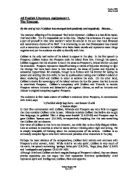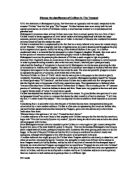Although Ariel and Caliban are both magical beings of Prospero’s island, they are almost precise opposites; you can argue that their opposition functions symbolically: Ariel represents spirit and intelligence; Caliban, flesh and appetite.
Ariel is light, airy and intelligent; Caliban is heavy, earthbound and often enough, stupid.
They are both also opposites in the sense of morality. Caliban is amoral, showing no remorse about his attempted rape of Miranda. When he plots with Stefano and Trinculo to kill Prospero and seize the island, he gives no thought to the morality of his actions. Ariel, in contrast, is an extremely moral character. His speech to the ‘three men of sin’ in Act III is practically a sermon on the Christian message of the necessity of repentance. Moreover, Ariel has suffered for his goodness and moral character, being imprisoned by Caliban’s mother, Sycorax for being ‘too delicate’ to carry out her commands.
Both Caliban and Ariel are strongly contrasted in the way they serve their master, Prospero. Caliban challenges the authority of his master. When Prospero summons Ariel, the spirit arrives with the speed of thought: ‘Come with a thought’, Prospero tells him. (Act IV Scene i). When Prospero calls for Caliban, he complains, ‘There’s wood enough within’ (I.ii.314) and delays for as long as he can (in his first appearance, he enters six lines after his summoning).
Ariel and Caliban do resemble each other in their desire for freedom. However, Ariel craves freedom because it is part of his nature to be free; although he serves Prospero grudgingly yet without a doubt, loyally, having a master is alien to his makeup. If Ariel’s nature embodies freedom, Caliban is by nature a slave, ‘I am all the subjects that you have’ (I.ii.341), almost legitimising Prospero’s rule over him; he only wants freedom because he is too lazy to work. When he acquires freedom, he misuses it. He needs a master to exercise the authority to keep him in control.
In the dramatic structure of the play, Caliban is even more significantly contrasted with Miranda. Shakespeare uses education to contrast Miranda, who has a ‘high’ nature, with ‘low’ natured Caliban. Miranda’s education nurtures her into a fine, moral and chaste young woman, a wonder of civilised grace, but Caliban’s education has helped mould him into a surly, malicious and perhaps the most upsetting to Prospero, a lustful monster. Caliban, as Prospero points out in Act IV Scene i, is a creature ‘On whose nature| Nurture can never stick’.
His education only makes him dissatisfied with his low status. As Caliban says, his main profit from learning language is knowing how to curse. Caliban has been educated yet he chooses to use his education negatively. When Miranda charges him with ingratitude, he replies, ‘You taught me language and my profit on’t| Is I know how to curse’ (I.ii.362-3).
Caliban’s low nature cannot be educated. He has little self-control, trying to rape Miranda, and he lacks any moral sense that instead of regretting his crime, he cries:
‘O ho, O ho! Would’t have been done!
Thou didst prevent me-I had peopled else
This isle with Calibans’ (I.ii.348-50)
Prospero concludes that Caliban, therefore is monstrous by nature but the issue is complicated by Prospero’s and Miranda’s claim that they have taught Caliban everything he knows. Prospero and Miranda both have contradictory views of Caliban’s humanity. On one hand, they think that their education of him has lifted him from his originally brutish status. On the other hand, they seem to see him as inherently brutish. His devilish nature can never be overcome by nurture, according to Prospero; Miranda expresses a similar sentiment in Act I Scene ii:
‘Thy vile race
Though thou didst learn, had that in’t which good natures
Could not abide to be with’
(I.ii.361-363)
The inhuman part of Caliban drives out the human part, the ‘good nature’, which is imposed on him.
Caliban perhaps represents Shakespeare’s interpretation of the New-World native. We know that Shakespeare turned to Montaigne’s essay on Cannibalism. Using this essay as research material, Shakespeare would have been exposed to the ideologies of the New-World natives. He would have found that the natives have a Utopian government and sanction adultery. The latter observation is especially relevant to the Tempest. The practice of free love could provide an explanation as to why Caliban is not only unrepentant for his attempt on Miranda, but also his incapability of seeing that there is anything to repent for. If Shakespeare’s making of Caliban is on the basis of this source or something similar, then it can be argued in Caliban’s defence that such behaviour was of the norm to him; he was not taught that such behaviour was amoral and simply unacceptable in the western society. However, even if his actions are justifiable on the basis that he did not know any different, he does not gain any votes of sympathy from the audience as chastity was of great importance to Jacobeans and Elizabethans and is both socially and morally unacceptable now.
So it can be concluded that, Prospero’s attempt to educate and civilise him have only succeeded in corrupting him and therefore Caliban represents a striking failure of Prospero’s art.
Surprisingly, Caliban also mirrors and contrasts Ferdinand in certain ways. In Act II Scene ii Caliban enters with a ‘burden of wood’, and Ferdinand enters in Act III Scene I ‘bearing a log’.
Both Caliban and Ferdinand profess an interest in untying Miranda’s ‘virgin knot’. Ferdinand plans to marry her, while Caliban has attempted to rape her. The glorified, romantic, almost ethereal love of Ferdinand and Miranda starkly contrast with Caliban’s desire to impregnate Miranda and people the island with Calibans. Ferdinand’s chastity forms a strong contrast to Caliban’s uncontrolled desire.
Caliban forms a strong contrast to the villains of the play, Antonio and Sebastian. Caliban strays into crime because he doesn’t know any better. Antonio and Sebastian, however, do/should know better; they are noblemen, and their only excuse for their behaviour is greed. Caliban’s character is largely influenced by other characters for example, in the presence of Prospero we are exposed to his foul mouth and vulgar speech however, in the presence of Stefano, someone who supposedly understands him; he is able to produce beautiful lines of poetry. Whether or not such influences can be used for or against him is debatable
Finally, and most tragically, Caliban becomes a parody of himself. In his first speech to Prospero, he regretfully reminds the magician of how, when Prospero first arrived, he showed him all there was to know about the island. Only a few scenes later, however, we see Caliban drunk and fawning before a new magical being in his life: Stefano and his bottle of liquor. Soon, Caliban is begging to show Stefano the island and even asks to lick his shoe. In this sub plot, Shakespeare has put the Europeans represented through Stefano and Trinculo on a pedestal, high and mighty; natural rulers and through Caliban a representative of the native man, quite low in the hierarchy of the human race. It could be said that Shakespeare, in our reading of the text in the 21st century is making a racist attack on the native man, Caliban by insinuating that a native man’s natural instinct is to obey, even when we are presented with the two lousy, drunken twosome that are Stefano and Trinculo.
‘Be not afeared, the isle is full of noises,
Sounds and sweet airs, that give delight and hurt not.
Sometimes a thousand twangling instruments
Will hum about mine ears; and sometimes voices
That if I then had waked after long sleep,
Will make me sleep again, and then in dreaming
The clouds methought would open and show riches
Ready to drop upon me, that when I waked
I cried to dream again.’
(III.ii.134-141)
Despite his savage demeanour and grotesque appearance, however, Caliban has a nobler, more sensitive side that the audience is only allowed to glimpse at briefly, and which Prospero and Miranda do not acknowledge at all. His beautiful speeches about his island home provide some of the most affecting imagery in the play, reminding the audience that Caliban really did occupy this island before Prospero came, and that he may be right in thinking his enslavement to be monstrously unjust.
Initially, Caliban was nurtured and educated on the island by Prospero. He was taught what he knew not. Both Prospero and Miranda gave him their trust and loved him dearly too. Caliban abuses their trust and shows ingratitude for their love by his attempted rape on Miranda. As a direct consequence of his actions, Prospero enslaves him and treats him harshly to the point of cruelty. He inflicts punishments on Caliban maliciously and for no real purpose. Caliban does not feel that he has done anything to deserve such hardship and although Caliban’s case can be argued strongly in his favour, we must also take into account Prospero’s perspective on the matter.
His brother usurps him of his dukedom and exiles him and his baby daughter to an unknown, no man’s land. Finding Caliban on the island as the only other being, he educates him, gives him ‘human care’ and affection. He tries to mould the monster into an all round better being. However, it seems he has failed and maybe his failure reminds him of his treacherous young brother, who also, like Caliban, betrayed him and his trust. Prospero inflicts pain on Caliban because it seems that is the only thing he understands and perhaps in inflicting such hardships he is not only punishing Caliban for his treachery but also, psychologically, his brother too.
In the first three Acts we are introduced to various ‘different’ Calibans. At times his speech is vile with images of vulgarity and at other times they are the most beautiful of lines that Shakespeare has ever written. Initially, having only seen the vile Caliban, we are shocked that he is capable of such language. Certainly this is a part of what makes him more likeable.
Caliban’s language is not only one of his downfalls but also one of his strengths. In Act I Scene ii lines 332-344, Caliban acknowledges the love and affection that Prospero and Miranda gave him when they arrived on the island. He talks of ‘Water with berries in’t and teach me how| To name the bigger light…’ but, unexpectedly at the back end of this beautiful speech he results in spitting more curses; ‘…toads, beetles, bats light on you!’ and the images are now animalist, reptiles of the low order, dark and earthy.
There are far more negatives in proportion to the positives that we get from Caliban in the first three Acts. His character is seen at an all time low when Stefano and Trinculo offer him a drink and he, in gratitude and foolishness swears his allegiance to them. Caliban, at the point of offering to lick Stefano’s shoes, has more resemblance to a fool than he does to Caliban: the poet. The audience, I believe, or at least I did, feel quite let down by his behaviour and how low he was willing to stoop to free himself of Prospero’s enslavement, regardless of Prospero’s treatment towards him. It seems that at this point he lacks compassion, dignity and grace.
Caliban’s swarthy appearance, his forced servitude, and his native status on the island have led many readers to interpret him as a symbol of the native cultures occupied and suppressed by the European colonial societies, which are represented through the power of Prospero. Whether or not one accepts this reading, Caliban remains one of the most intriguing and ambiguous minor characters in all of Shakespeare, a sensitive monster who allows himself to be transformed into a fool, primarily and largely by himself but also through the help of other characters.







